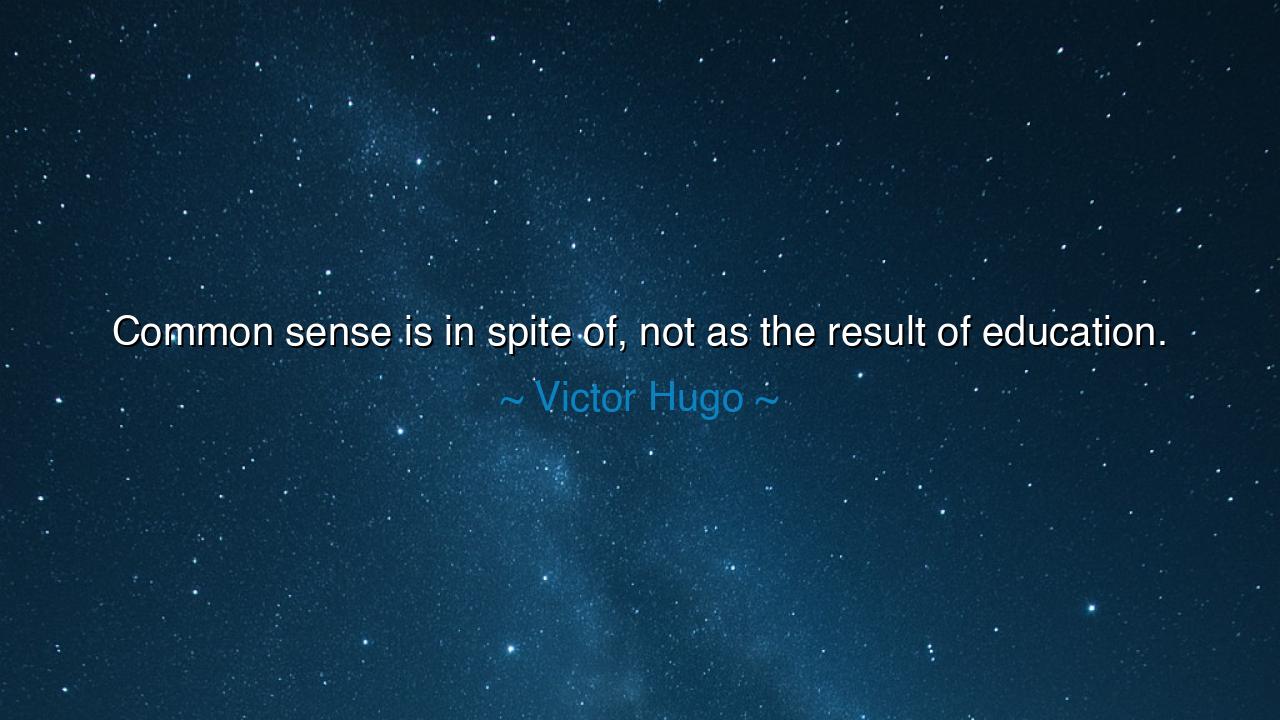
Common sense is in spite of, not as the result of education.






“Common sense is in spite of, not as the result of education.” — Victor Hugo
In this piercing declaration, Victor Hugo unveils a truth that cuts through the pretensions of the learned and humbles the proud halls of scholarship. Common sense, that quiet, steadfast wisdom which guides men through storms and temptations, is not born in lecture halls nor bestowed by degrees. It is the natural light of reason that flickers within every human soul—a light that persists in spite of education, not because of it. For education may fill the mind with words, but common sense teaches the heart how to live.
The great thinkers of old understood this paradox well. They knew that knowledge and wisdom are not the same. Knowledge can be taught; wisdom must be lived. A man may learn to speak of the stars and yet stumble over a stone at his feet. He may quote philosophers and still fail to understand his neighbor’s sorrow. It is common sense—born of experience, compassion, and honest perception—that keeps a person grounded when intellect soars too high into the clouds. Many a scholar has drowned in the sea of theory, while the humble farmer, guided by common sense, found safe harbor through the storm.
Consider the tale of Socrates, the wisest man of ancient Greece. Though surrounded by the scholars of Athens, he claimed to know nothing—and in this humility lay his greatness. While others sought to conquer truth with clever arguments, Socrates listened to the voice of reason that lived within the heart. He questioned, not to display learning, but to uncover simplicity and truth. His common sense shone brighter than the learned arrogance of his accusers. In the end, he proved that the highest wisdom does not come from schools but from the soul that dares to see clearly.
Education, noble though it may be, can often veil the truth with pride. The mind, when puffed with knowledge, can forget its own limits. One who reads many books may believe himself wise, but wisdom laughs gently at such delusion. For common sense is the guardian of truth against the excesses of intellect. It reminds the learned man that fire burns, that hunger hurts, that love heals—all the things no book can truly teach. Without it, education becomes an ornament of vanity, a tower built on sand.
Think of the countless rulers and ministers throughout history who, armed with education and refinement, led their nations into ruin. Yet among the common folk, unlettered and unseen, there were always those who understood the simple laws of life: that greed breeds suffering, that kindness yields strength, that truth cannot be twisted forever without breaking. Their common sense—clearer than the polished reasoning of scholars—was the saving grace of humanity, the wisdom of the earth itself.
The lesson, then, is this: seek knowledge, but let it never smother the voice of simplicity. The mind must bow before the heart’s understanding. Listen to experience, to intuition, to the truths that life whispers in moments of silence. When the educated world argues endlessly, common sense quietly acts, and through action, reveals the truth. True wisdom is not found in the possession of facts, but in the discernment of what truly matters.
So, to those who walk the path of learning, remember Victor Hugo’s warning: do not let education drown the clarity of your soul. Study deeply, but live simply. Read much, but listen more. Let your wisdom rise not from pride in what you know, but from humility in what you see. For when all the theories have faded and the books are closed, it is common sense—that ancient, enduring compass—that will guide you safely through the tempests of life and lead you, at last, to peace.






AAdministratorAdministrator
Welcome, honored guests. Please leave a comment, we will respond soon